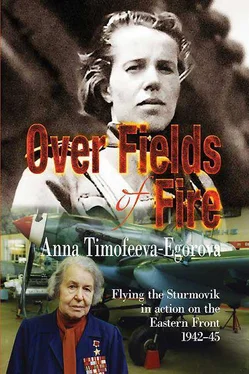But the route had got no easier for having been reconnoitred. There was the same blizzard, the same snow, the same almost blind flying. But to be honest, it was easy to position myself on the map knowing the precise location of the troops. However, I had to go quite a bit off track as there were no cavalry at the old location — they had already taken cover somewhere. Having lost hope of a successful search I decided to land the plane and question the locals. Landing near a small unremarkable hamlet and leaving the engine on, I ran across the snowdrifts to the nearest hut. I knocked on the window with frozen-through fingers and this made a kind of especially resonant and booming sound as if someone had tapped one icicle on another. An old man in an undershirt over his pants and in valenki came out at my knock A very old man but sturdy and upright… “Grandfather, have our men passed through here?”
The old man hastily interrupted me: “Get out as fast as you can, sonny! The Germans are here, came last night!”
He pointed and turning around I saw Fascists by the next hut. I should have run straightaway but my legs had become as if paralysed, somehow numb and wouldn’t move at all. The old man saved me, giving me a shove in the back and I rushed towards my salvation — to my faithful ‘cropduster’. The rattle of a machine-gun burst rolled over me from behind, I turned back and saw the old man in the white shirt crashing down into the snow. And whilst I ran to the plane he kept looming up in front of me — that sturdy man who seemed to have stepped out of a fairy tale. But another machine-gun burst reminded me that this was no fairy-tale. Then I nimbly jumped into the cockpit and revved up. My U-2 shuddered and quickly slid across the snow field on its skis. It took off under a hail of bullets and not all of them missed. The mirror on the centre-section stanchion was smashed and the percale on the right wing was rattling… I was very hot but my teeth were chattering as if from cold…
Not till the end of the day did I had manage to locate the cavalry again. I came across the now familiar colonel — the head of Intelligence — in the school building where the corps headquarters was situated.
“Congratulations on your safe arrival”, he greeted me and walked me to Parkhomenko immediately. “Comrade General, here is the messenger from Front headquarters”, the Colonel reported and handed the package over to the Corps Commander.
“Call him over, let him in”, the General ordered mixing Ukrainian words with Russian, without lifting his head up from the map and not noticing who had come. But then he raised his head and I saw a face lined by fatigue and sleepless nights. But the strain of field life did not seem to have affected the General’s habits. He was carefully shaved, his hair was combed. He breathed neatness and true cavalry bearing. I stood to ‘attention’ without noticing, which didn’t escape the General’s eye.
“At ease, at ease”, he ordered jokingly. “You bear good tidings, you eagle! Did you bring the radio?”
“Yes!”
At this moment claps from nearby shell bursts resounded from outside the windows. To all appearances the Fascists had intensified the barrage. The General pricked up his ears: “The Devil sent you, lad!” he said. “You’ve brought trouble down on us. You’ve disclosed our location. See what the Hitlerites are up to?”
The Corps Commander had not guessed there was not a ‘lad’ but a ‘lass’ before him. It didn’t seem the right moment to explain what was what. The shells and mortar bombs were exploding closer and closer, shaking the building. Window glass jangled somewhere just nearby and I heard shrapnel rattle on the roof. Parkhomenko remained unruffled and sat at his desk as calmly as before, his chest, decorated with battle awards, spread wide. However I was unable to stay calm. I was seriously concerned about the fate of my machine. My mission was complete and I had to rush back — it would be dark soon.
“Comrade General, what should I tell Front HQ?” At last I dared to ask.
“What should you tell them?” Parkhomenko rumbled. “You’re making fun, aren’t you? Don’t you see what kind of fire you’ve brought down with your ‘cropduster’? It’s too late to fly, lad. You’re staying here with us. Let your bird damn well burn! We’ll find you a horse and teach you to sabre”.
But no, I couldn’t burn my ‘bird’. After all, I had been ordered to come back and I was supposed to obey orders. Running from the General’s office I rushed towards my plane along wicker fences and huts. It turned out to be a long way. Fire sometimes pinned me down to the ground but I kept running from one shell-hole to another, relying on an old frontline belief that a shell would never hit the same spot twice. Fortunately I reached the plane in one piece and alive, but when I tried to start the engine I found it had been damaged. What a disaster… So it had been hit by shrapnel. I had to make my way back to Headquarters along the same route. Cavalrymen were dashing back and forth, soldiers were loading carts with their humble possessions: the headquarters was preparing for evacuation. Parkhomenko met me with the words, “So, lad, you’ve decided to stay with us?”
“No, Comrade General, I request assistance!”
“What kind of assistance?”
“I need a horse to tow the plane away…”
“I have no spare horses, don’t you see what position I’m in?”
But I managed to convince the Commander: he gave me a horse. Rope was found as well. I tied it to the undercarriage axle with two knots and made kind of a collar on the horse’s neck. I had everything attached and I was just about to take the horse by the bridle and go when a rider came to give me a hand — a hefty bloke from the Kuban Cossacks. He grumbled, fixing up the traces: “What the hell do we need this plywood jalopy for? If we hang around at all Fritz will nail us.”
“So hurry up if you don’t want to get nailed”, I hurried him.
“Hurry up, hurry up? A horse likes it when everything’s done neatly. Each rope should be just right… It’s no good for a beast to have its withers or whatever rubbed raw. It’ll die…” At last the bloke took the horse by the bridle and yelled loudly:
“Well, darling, off you go!”
I took hold tightly on a wingtip so as to hold it on the bumpy road. Fortunately, a heavy snowfall began soon and then night fell — it hid us from the enemy shells. It was the first and only time in my life I ‘flew’ such an unusual horse-drawn carriage. The horse, worn out during the raid pulled without haste, paying no attention to the road. The plane groaned sadly on the bumps. Something cracked alarmingly inside with every new rut. The wings, clumsy on the ground, now bent down to the very snow, now resiliently straightened, lifting me with them. This unnatural vibration didn’t cheer me at all: it looked as if I was about to lose my wings. But, be that as it may, with the help of the horse and the gloomy rider I managed to drag the plane to a safe place. We stopped in some village and in the morning I had time to poke around the engine. I asked the lady of the hut we’d stopped in to warm up some water, drained the oil from the engine into a cast-iron pot and put it into the oven too. Then my helpers from the cavalry helped me pour the now-hot oil into the tank, splashed hot water over the carburettor and began to turn it over. To everyone’s joy the engine sneezed a couple of times and then started.
More than once on that February day I thought kindly of my aeroclub teachers. No, it hadn’t been a waste of time to make the student pilots take apart and put together all the engine components, it hadn’t been for nothing they’d made us stay after flying, to tinker with the machine along with the mechanic. If you want to fly well — know your plane perfectly! Such had been the rule. And now a thorough knowledge of the equipment had helped me to handle the repairs.
Читать дальше












